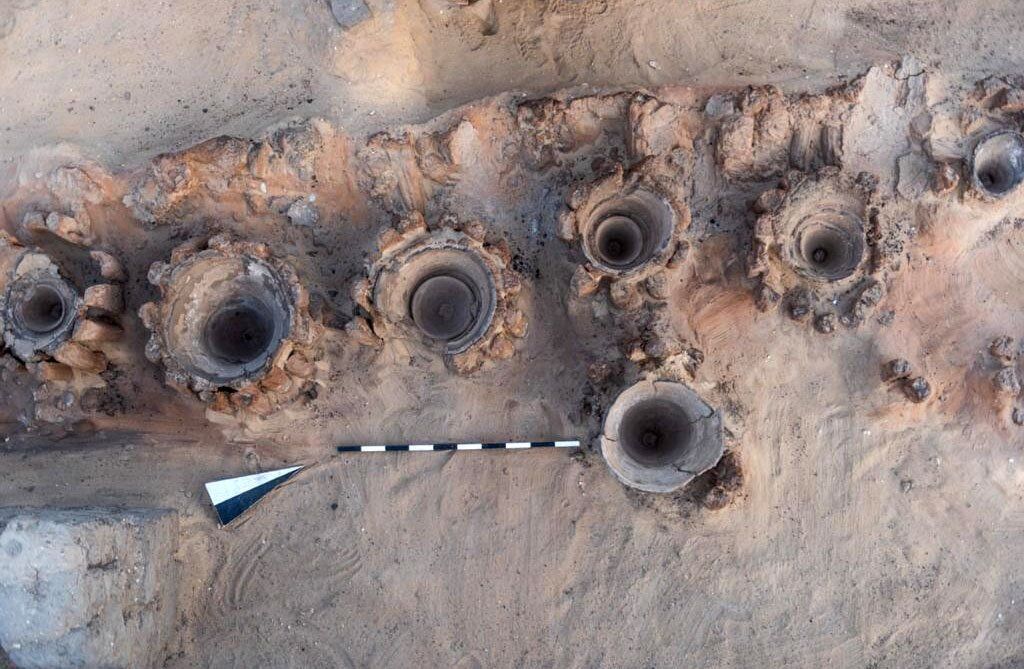World’s Oldest ‘Industrial-Scale’ Brewery Found in Egypt
Located in an ancient necropolis, the 5,000-year-old facility was capable of producing up to 5,900 gallons of beer at a time
:focal(433x351:434x352)/https://tf-cmsv2-smithsonianmag-media.s3.amazonaws.com/filer/62/fb/62fb0196-9cd4-4699-881b-e2bcb7277b69/thebreweryun.jpg)
Before the ancient Egyptians built the pyramids for departed pharaohs, they honored their dead in a different way: with huge quantities of beer. Now, archaeologists from Egypt and the United States have found a 5,000-year-old large-scale brewery at a funerary site in North Abydos.
The brewery probably dates to the time of King Narmer, who ruled ancient Egypt around 3150 B.C., reports Agence France-Presse. It houses eight large areas for beer production, each containing about 40 earthenware pots arranged in rows. Workers would have heated grains and water in the vats, which were held in place by clay levers.
Evidence found at the archaeological site—located in the southern Egyptian city of Sohag—suggests that the beer was used in sacrificial rites. The brewery “may have been built specifically to supply the royal rituals that were taking place inside the funeral facilities of the kings of Egypt,” says joint expedition leader Matthew Adams, an archaeologist at New York University, in a statement from Egypt’s Ministry of Tourism and Antiquities.
As Adams tells CBS News’ Ahmed Shawkat, British archaeologist T. Eric Peet investigated the site more than a century ago and found what he believed to be systems for drying grain to guard against rot. But further exploration at other Egyptian sites with similar artifacts suggested that these features were actually used for beer-making.
The site Peet discovered was lost until 2018, when researchers rediscovered it using magnetic survey technology. They found that the sheer scale of the brewery made it unlike any of the other beer-making facilities. The setup appears to have allowed for the production of 5,900 gallons at a time.

“That’s enough to give every person in a 40,000-seat sports stadium a pint,” Adams tells CBS. “This is Egypt’s, and perhaps the world’s, earliest example of truly industrial-scale beer production.”
The facility’s scale also highlights the wealth of Egypt’s rulers from the start of the pharaonic period, which likely began with Narmer (though some accounts place his rule at the end of the predynastic period). He is said to have united Upper and Lower Egypt, and his name is recorded as the first on ancient lists of kings found in the Abydos tombs.
Abydos, one of the most significant archaeological sites of ancient Egypt, held the tombs of kings dating back even before the start of the dynastic system. It served as the royal cemetery for the first and second dynasties and remained significant as a site dedicated to the dead during the Old Kingdom period, when the pyramids were built. The necropolis was associated with the jackal god Khenti-Imentiu and later became the center of the cult of Osiris.
Adams tells CBS that Narmer and his successors built huge “royal cultic enclosures” at Abydos, where people conducted rituals with offerings to the dead on a large scale.
“These included, first and foremost, beer, with thousands of pottery ‘beer jars’ found in and around some of the funerary temples,” he says.
Per Nafisa Eltahir of Reuters, the discovery comes at a time when Egyptian officials are eager to highlight archaeological findings as the country’s tourism industry tries to recover from the Covid-19 pandemic. Tourists visiting Egypt dropped from 13.1 million in 2019 to 3.5 million last year.
Among the finds announced in recent months are a mummy with a gold tongue, an ancient Egyptian queen’s tomb and a trove of sealed sarcophagi at the Saqqara necropolis. Saqqara’s story will be told in the Smithsonian Channel docuseries Tomb Hunters, scheduled to air later this year.
/https://tf-cmsv2-smithsonianmag-media.s3.amazonaws.com/accounts/headshot/Livia_lg_thumbnail.png)
/https://tf-cmsv2-smithsonianmag-media.s3.amazonaws.com/accounts/headshot/Livia_lg_thumbnail.png)